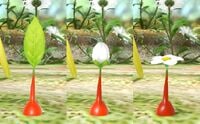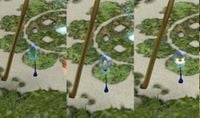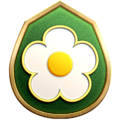Maturity: Difference between revisions
Tag: Mobile edit |
(→In Pikmin Bloom: Added in a detail specifying the nature of what's attached to a bare Pikmin's stem. Pretty fascinating, I was half-tempted to link the floral axis Wiki page.) Tag: Mobile edit |
||
| Line 73: | Line 73: | ||
==In ''Pikmin Bloom''== | ==In ''Pikmin Bloom''== | ||
In {{pb}}, maturity is more complex than in the main games, and affects different things. Leaf, bud, and flower maturities exist, but in this game there are many different kinds of flowers – over 30 types, representing several species of flower. In addition, Pikmin can be bare, having neither a leaf, bud, nor flower on their stem. The main way to change a Pikmin's maturity is by feeding it [[nectar]] in the [[Pikmin Bloom interface#Garden|garden screen]]. Nectar is fed to Pikmin individually in this game. Each type of flower has a corresponding nectar type, and feeding a Pikmin that nectar type will change its maturity to that flower type. The exception is regular white nectar, which changes leaves to buds, and changes buds or flowers to white flowers. If a Pikmin is fed nectar too many times in a row, it will become bare and can no longer be fed until it regrows a leaf. | In {{pb}}, maturity is more complex than in the main games, and affects different things. Leaf, bud, and flower maturities exist, but in this game there are many different kinds of flowers – over 30 types, representing several species of flower. In addition, Pikmin can be bare, having neither a leaf, bud, nor flower on their stem, instead retaining only the floral axis from their flower. The main way to change a Pikmin's maturity is by feeding it [[nectar]] in the [[Pikmin Bloom interface#Garden|garden screen]]. Nectar is fed to Pikmin individually in this game. Each type of flower has a corresponding nectar type, and feeding a Pikmin that nectar type will change its maturity to that flower type. The exception is regular white nectar, which changes leaves to buds, and changes buds or flowers to white flowers. If a Pikmin is fed nectar too many times in a row, it will become bare and can no longer be fed until it regrows a leaf. | ||
A Pikmin's maturity does not affect its movement speed on [[expedition]]s, but it does affect its attack power on [[mushroom challenge]]s. Leaf Pikmin gain 1 point of strength, bud Pikmin gain 2, Pikmin with a regular flower gain 3 and Pikmin with a special flower gain 4 points to strength. Bare Pikmin gain no additional strength points from maturity. | A Pikmin's maturity does not affect its movement speed on [[expedition]]s, but it does affect its attack power on [[mushroom challenge]]s. Leaf Pikmin gain 1 point of strength, bud Pikmin gain 2, Pikmin with a regular flower gain 3 and Pikmin with a special flower gain 4 points to strength. Bare Pikmin gain no additional strength points from maturity. | ||
Revision as of 17:22, April 8, 2023
|
This article or section is in need of more images. |
- "Bud" redirects here. For bud plants that spit Pikmin seeds, see candypop family.
Pikmin can be in one of three stages of maturity: leaf, bud, or flower. In the main series, the more mature a Pikmin is, the faster it becomes at walking and carrying items, making it more efficient at completing tasks. As such, it is in the player's best interest to keep their Pikmin in high maturity. A Pikmin's stage can be identified by what's on top of its stem, and there are several ways for Pikmin to both increase and decrease in maturity.
All Pikmin start in the leaf stage when created by the Onion. (Although Pikmin start their life as a seed, and then a sprout, those stages are separate from maturity, since they already have a leaf when that happens.) When stored inside an Onion, Pikmin do not lose their maturity, meaning that the player will not lose flower or bud Pikmin between days. When pulling Pikmin out of an Onion, flower Pikmin come out first, then buds, and finally leaves.
The standby Pikmin icon in the first two games makes the distinction between different maturities of Pikmin. Before throwing in Pikmin 2 and the two New Play Control! remakes, it is possible to swap out a Pikmin on a leader's hand for one of a different maturity within the same type; this can be achieved by pressing ![]() /
/ ![]() .
.
Because a higher maturity is considered better than a lower one, some rankings in the games use icons based on the Pikmin stems' tops to symbolize their value. For instance, in Mission Mode, the bronze medal has a leaf icon, the silver medal has a bud, and the gold and platinum medals have a flower. Analogously, flowers are sometimes depicted in the series as symbols of evolution or idealism, such as the Pikmin 2 Challenge Mode levels on the grid changing to flowers upon completion.
In the main series
Stages
- Leaf
The first stage. A simple green leaf grows atop the stem. Pikmin in this state move at the slow, default speed, making them inefficient for carrying objects. Pikmin always start off as leaf Pikmin when created by the Onion.
- Bud
The second stage. These Pikmin have a round bud on their stem. Pikmin normally have white buds, but Purple and White Pikmin have magenta buds, and Rock and Winged Pikmin have lavender ones. At this maturity, Pikmin are moderately faster than leaf Pikmin.
- Flower
The final stage, also called "blossom" by Captain Olimar.[1] Flower Pikmin are the fastest, and move twice as fast as leaf Pikmin (for all types except Purple Pikmin and White Pikmin). They grow a chaenostoma cordatum atop their stems. In Pikmin, flower Pikmin that die in battle have a chance of leaving behind a sprout that appears the following day. The color of a Pikmin's flower is the same as the color of its bud.
In Pikmin and Pikmin 2, a flower Pikmin twirls horizontally in the air after it reaches the apex of its throw arc. When it does this, it falls down slightly slower than leaf or bud Pikmin. This twirl also makes the Pikmin lose some horizontal momentum, which makes leaf and bud Pikmin fall farther in a throw than flower Pikmin. In the New Play Control! versions, flower Pikmin stop somersaulting in the apex and fall down straight, resulting in them landing at the same time and in the same position as leaf or bud Pikmin. Purple Pikmin do not have any sort of horizontal twirl in any game, since they pound after the apex.
Increasing
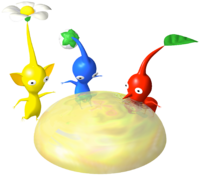
The most basic way for Pikmin to increase in level is to let them remain underground for some time without plucking them. As they stay underground, they extract nutrients from the soil,[2] which allows them to evolve from their current stage to the next one every few minutes.
The other common way to have Pikmin mature is to feed them nectar. This will instantly set them to flower status if they are on the leaf or bud stages.
Other ways also exist:
- In Pikmin 3, an ultra-spicy spray instantly matures all Pikmin in the party to the flower stage, as well as power them up temporarily.
- Yellow Pikmin that complete an electrode's circuit will instantly flower up as if they drank nectar.
- If a Mamuta plants Pikmin, they instantly evolve to the flower stage.
- In 2-Player Battle, the flower power-up will instantly flower up all non-buried Pikmin that belong to the player that used it.
Buried Pikmin
In the first two games, buried flower Pikmin wither and disappear if left underground for too long, but do eventually return as a leaf, where the cycle repeats. Interestingly, in Pikmin 3, buried Pikmin will not be able to evolve past leaf stage on the first day, nor on Brittany's section of the first Distant Tundra day, presumably because both of these events do not have time periods and players would thus be able to wait until the Pikmin become flowers without consequence. In Pikmin 3, Pikmin that are buried and far from the player will also not evolve, probably because they are off camera; their maturation timer only moves when the player is close to them.
In Pikmin and Pikmin 2, Pikmin only evolve if the leader is in the same area they are, and if the gameplay is playing. This means that if the player returns to a buried leaf Pikmin some day later, they will not find a flower Pikmin, regardless if the day with the leaf Pikmin was ended with the pause menu or not. In Pikmin 3 though, this was changed so that Pikmin that stay buried overnight will evolve to the flower stage, and since buried Pikmin in the flower stage do not revert like in the previous games, leaving buried Pikmin overnight is a good way to evolve them. This is also true if the player ends the day early from the pause menu (even if the Pikmin don't appear as flowers in the sunset cutscene), and works regardless of how long during the day the buried Pikmin has been left.
In all games, buried Pikmin take 2 minutes to advance in stage. In Pikmin and Pikmin 2, once a buried Pikmin reaches the flower stage, it stays that way for 3 minutes, where it eventually wilts and disappears; it stays as a flower forever in Pikmin 3. After wilting, a Pikmin takes 1 minute to return as a leaf in Pikmin, but only 8 seconds in Pikmin 2.
Decreasing
There are some ways for Pikmin to decrease in maturity in the first two games, in a process known by fans as "deflowering" or "depetaling". Pikmin in Pikmin 3 will never regress in maturity.
- In Pikmin and Pikmin 2, Pikmin that get knocked down in battle have a random chance of decreasing in maturity. In Pikmin, a Pikmin will only decrease to the maturity directly under the one it is on, but in Pikmin 2, the decrease will happen straight to the leaf stage.
- The Withering Blowhog's breath can revert Pikmin back to the leaf stage.
- In Pikmin and Pikmin 2, if a flower Pikmin is left underground for too long, it disappears, and reappears some seconds later with a leaf status. This is accompanied by a low-pitched humming sound that can be heard throughout the entire area.
- In 2-Player Battle, an ultra-bitter spray used against the opponent's Pikmin will bury them and revert them to the leaf stage.
A "rebirth" via a Candypop Bud could be considered a way for a Pikmin's status to revert back to a leaf, and this is true for every game, although technically, the Pikmin that gets tossed in disappears and a new one is born in its place.
In alternative game modes
In Bingo Battle, a Pikmin's leaf or flower is the same color as the team it's on – cyan for player 1, and pink for player 2. In both 2-Player Battle and Bingo Battle, maturity does not have an impact on what Pikmin will win a fight when Pikmin are attacking each other. Also to note is that in Bingo Battle, it is not possible to get bud Pikmin because they cannot evolve if they are left underground, but this is not true in Pikmin 2's 2-Player Battle mode.
Badges
In Pikmin 3 Deluxe, there is a badge the player can gain from maturing Pikmin:
- Flower Grinder: Mature 500 Pikmin to the flower stage in Story Mode.
In Hey! Pikmin
In Hey! Pikmin, maturity is bound to the number of Pikmin under Olimar's command in the current area. This is only for aesthetics and does not affect the gameplay. Pikmin mature in three stages; leaf, bud and flower. Pikmin start off as leaf and grow buds when there are eight Pikmin under Olimar's command. These buds bloom into flowers when there are sixteen Pikmin under Olimar's command. Wild Pikmin are always in the leaf stage and will automatically convert to the stage in Olimar's team when connected. Losing Pikmin can result in their maturity downgrading.
Pikmin in the Pikmin Park have maturities picked at random, and once again, these do not affect the performance of the Pikmin, and are just for show.
In Pikmin Bloom
In Pikmin Bloom, maturity is more complex than in the main games, and affects different things. Leaf, bud, and flower maturities exist, but in this game there are many different kinds of flowers – over 30 types, representing several species of flower. In addition, Pikmin can be bare, having neither a leaf, bud, nor flower on their stem, instead retaining only the floral axis from their flower. The main way to change a Pikmin's maturity is by feeding it nectar in the garden screen. Nectar is fed to Pikmin individually in this game. Each type of flower has a corresponding nectar type, and feeding a Pikmin that nectar type will change its maturity to that flower type. The exception is regular white nectar, which changes leaves to buds, and changes buds or flowers to white flowers. If a Pikmin is fed nectar too many times in a row, it will become bare and can no longer be fed until it regrows a leaf.
A Pikmin's maturity does not affect its movement speed on expeditions, but it does affect its attack power on mushroom challenges. Leaf Pikmin gain 1 point of strength, bud Pikmin gain 2, Pikmin with a regular flower gain 3 and Pikmin with a special flower gain 4 points to strength. Bare Pikmin gain no additional strength points from maturity.
Automatic maturity changes
While feeding Pikmin nectar is the main way to change their maturity, there are a number of ways for a Pikmin's maturity to automatically change, either from leaf to bud, from bare to leaf, or from any maturity back to leaf.
At 4:00 AM local time each day, all Pikmin have their maturity reset to the leaf stage. This includes Pikmin on expeditions or mushroom challenges, though Pikmin fighting a mushroom will not have their attack strength adjusted as a result of their maturity changing, even though the user interface makes it appear that they do.
Whenever a Pikmin's maturity changes to either bare or leaf, a hidden timer begins counting down. Once this timer expires the Pikmin will automatically progress into the next stage of maturity. For bare Pikmin this timer is set at 6 hours, and for leaf Pikmin the timer is set at 8 hours. Every step taken during this period will reduce the total timer by 12 seconds. While this rule applies to all bare Pikmin in the player's collection regardless of assignment, only leaf Pikmin active in the player's squad will have their budding timers reduced by the player's step count. When a Pikmin auto-buds while in the squad, a short animation of a flash of light appears above the Pikmin, and their stem is affixed with a brand new bud. If the garden screen isn't open at the time the auto-budding happens, the animation will play the next time the garden is opened.
Steps contributing to Pikmin maturity timers are not subject to the same retroactive scrutiny that the daily "My Steps" counter is. Therefore, determining the step contribution to maturity is best done by tracking the change in the "Walked Together" count found on a Pikmin's status screen. Note that this figure is a product of the "maturity step" count, not the origin of it. Ergo, bare Pikmin not active in the squad will still have their timers reduced, but their "Walked Together" count will not reflect the numerical change.
When the 4:00 AM reset occurs, the game will try to contact the server to confirm the new maturity status of the Pikmin. This may take a while to happen, and it relies on the phone's location services being on, as well as the game's background processes running in full. While most players will find all of their Pikmin budding between 12:00 PM to 12:10 PM due to this (provided said Pikmin haven't changed maturity in the meantime, of course), failure for this background exchange to occur near the reset can also cause automatic budding to occur much later than midday. If the server exchange delay is great enough, automatic budding may not even occur during a given daily cycle. This is due to automatic maturity changes ceasing overnight, between 9:00 PM and 4:00 AM.
In other media
|
This article or section features debatable canonical information. |
In the Pikmin Short Movies
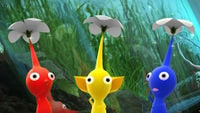
The Pikmin Short Movies portray Pikmin changing maturity in ways that do not coincide with the canon games. While at times the change in maturity is mostly a visual gag, there are situations where the evolutions have an impact on the outcome of the story.
In Treasure in a Bottle, the Pikmin outside of the bottle change from leaf to flowers when they come up with an idea. This is likely a take on the cartoon joke where characters that come up with ideas receive a glowing lightbulb on top of their heads.
Near the end of Occupational Hazards, when the Pikmin and Bulborb are falling from the backhoe's bucket, the Pikmin's leaves turn into flowers, serving as parachutes. When Yellow Pikmin touch the backhoe's battery, their leaves turn into buds and start blinking, which is something that does not happen in Pikmin 3; when they finish the circuit, their buds stay the same, whereas in the third Pikmin game, finishing a circuit rewards all Pikmin involved with a flower status. This is likely a visual gag based on the fact the blinking buds resemble Christmas lights. A Red Pikmin can also be seen evolving into a flower after emerging from the mud, in the scene after the Fiery Blowhog is defeated, but the reason for this is not known.
In addition to this, in the opening to The Night Juicer, some mature Purple Pikmin have erroneously white-colored flowers. However, this was most likely done for the sake of having the Pikmin logo, which they help form, all white.
In the Super Smash Bros. series
In the Super Smash Bros. series, the Pikmin following Olimar start on the leaf stage when plucked, and slowly evolve into buds and then flowers as they stay on the battlefield. This change is only aesthetic, though, although it is the main concept behind event #14: "Sproutage of the Flower Pikmin", in Brawl. To save on performance, Pikmin always stay on the leaf status in Super Smash Bros. for Nintendo 3DS.
In Pikmin Adventure
In the Nintendo Land attraction Pikmin Adventure, Olimar players and Pikmin players may collect blobs of nectar to increase a numeric level. Three drops of nectar are needed to increase one level, and between levels 1 and 4, that player's Pikmin will be in the leaf stage. Between levels 5 and 9, the bud stage, and from 10 onward, the flower stage. Although the maturity itself has no impact on the Pikmin's performance, the numeric level does. The Olimar player also receives an increase in Pikmin number when evolving to a new stage.
Gallery
The Mission Mode bronze medal for Collect Treasures. Note the use of a leaf Pikmin.
Trivia
- There is a glitch in Pikmin that makes it possible for Onions to spit out seeds with buds or flowers, depending on the last Pikmin plucked. The Pikmin itself will still start on the leaf stage, so this is merely aesthetic.
- In Pikmin 2, the sound used when a Pikmin's bud or flower wilts (whether because of a Withering Blowhog or by staying underground too long) is the same sound that plays when a Candypop Bud wilts, but slightly modified.[3]
Names in other languages
| Language | Name | Meaning |
|---|---|---|
| Madurez | Maturity |
Stages
| English | (traditional) |
(simplified) |
||||||
|---|---|---|---|---|---|---|---|---|
| 葉っぱ | Leaf | 葉子 | 叶子 | Feuille | Blatt | Foglia | 잎사귀 | Hoja |
| つぼみ | Bud | 花苞 | 花蕾 | Bouton | Knopse | Bocciolo | 꽃봉오리 | Brote |
| 花 | Flower | 花朵 | 花朵 | Fleur | Blüte | Fiore | 꽃 | Flor |
See also
References
- ^ “What exactly are these Pikmin? One could classify them as both plant and animal. They mature from leaf, to bud, and finally to blossom. When all of one color are lost, the Onion instinctively puts out new seeds... How does it know to do this? What a mysterious life-form!” – Captain Olimar in his voyage log
- ^ “If you leave Pikmin in the ground for a while without picking them, they will extract more nutrients from the soil and grow as shown below.” – Pikmin Growth section in the Pikmin instruction manual
- ^ YouTube video that explains some of Pikmin 2's sounds
| Pikmin | |
|---|---|
| Types | Red Pikmin • Yellow Pikmin • Blue Pikmin • Purple Pikmin • White Pikmin Rock Pikmin • Winged Pikmin • Ice Pikmin • Bulbmin • Glow Pikmin |
| Biology | Candypop Bud • Idle • Maturity • Onion • Flarlic • Pellet Pikmin extinction • Trip • Sprout • Seedling • Soul • Squad |
| Abilities | Carry • Dig • Dodge • Fight • Hide |
| Controls | Charge • Dismiss • Swarm • Pluck • Throw • Whistle |
| Other | Decor Pikmin • Leafling • Mushroom Pikmin • Pikpik carrot |
| Pikmin Bloom articles | |
|---|---|
| Pikmin | Decor Pikmin • Special Decor Pikmin • Friendship • Maturity • Seedling • Squad |
| Items | Badge • Coin • Fruit • Nectar • Petal • Postcard |
| Activities | Expedition • Flower planting • Party Walk • Weekly challenge |
| Places | Big Flower • Mushroom • Special Spot |
| Game mechanics | Detector • Event • Friend • Level • Lifelog • Mii • Planter Pack |
| Miscellaneous | Shop • Soundtrack • User interface • Loading screen • Version history |
| Website | Flower Personality Quiz • Master Quiz • Web store |
